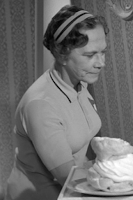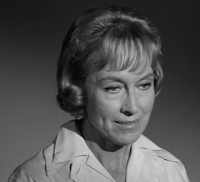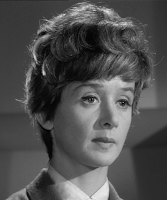Oscar Millard (1908-1990) was born in London and began writing articles for British periodicals in 1934. He wrote a biography in 1936 and a novel in 1937. After the war, he was hired by Fox as a contract screenwriter and wrote films from 1949 to 1972 and TV shows from 1955 to 1975. In addition to an episode of Thriller, he wrote two episodes of The Alfred Hitchcock Hour. His papers are at the University of Wyoming.
"Consider Her Ways" was a novella by English writer John Wyndham that was first published in the 1956 volume,
Sometime, Never, which was a collection of three novellas; the other two were by William Golding and Mervyn Peake.
Awakening in an unfamiliar place with no memory of the past, a young woman sees that she is one of several women lying on trollies, their bodies enormous. She believes that she must be dreaming or hallucinating and wonders what it all means. After small women take her to a van, she is transported along a road and sees women who look like Amazons working along the roadside. After the van passes blocks and blocks of pink buildings, she is welcomed home as Mother Orchis, one of several enormous women lying in beds. She is said to have recently given birth to four babies and is fed a huge meal; one of the other women, Mother Hazel, is skeptical of her claims of amnesia.
 |
| Oscar Millard |
Mother Orchis is mocked when she asks for something to read; the other women insist that all that matters is having babies. She is frustrated and calls for help from Donald, suddenly remembering that she has a husband. The other women are not familiar with the term "husband," nor have they ever heard of the word "man." More memories return and the woman recalls having grown up as Jane Summers until she married Donald Waterleigh, who was killed six months later. A doctor, she was slender and attractive, in contrast to her current shape. Two women called Servitors begin to massage her but, when she shoves them away, she is visited by a doctor who examines her and takes her to the sick bay after she demonstrates her ability to read and write.
Jane argues with the doctor, insisting that she is having a hallucination; the doctor replies that she was developed to be a mother. She is left alone and manages to make her way outside, where she falls down some steps and passes out. Though Jane is arrested and accused of Reactionism, the doctor refuses to let Amazons take her and she is interrogated by a group of women. She recalls that her husband was a test pilot, and after he died she returned to her profession as a doctor. She volunteered to try a new synthetic drug called chuinjuatin; Indians in Venezuela had taken the original form of the drug and believed it liberated the spirit from the body, "'setting it free to wander anywhere in space and time.'" Jane took the drug and woke up in an unfamiliar body and an unfamiliar world.
 |
| Barbara Barrie as Mother Orchis |
She is transported to a Regency-style house, where she meets an elderly historian named Laura, who suggests that Jane represents "'a genuine case of transferred personality,'" a rare occurrence and one where prior cases have been associated with chuinjuatin. Laura explains that all of the men on Earth got sick and died, leading to a collapse of civilization. She adds that, in the past, men had developed the notion of Romance in order to subjugate women and support an economic model of society where women were exploited by and dependent on men.
Laura explains that order was restored eventually and men were forgotten. Various ways to organize an all-female society were studied until it was decided to follow a model found in the Bible, summarized by the line, "Go to the ant, thou sluggard; consider her ways." Jane is shocked to learn that society is now organized like an ant colony, with an educated ruling class, mothers, servants, and workers all doing their respective tasks. Laura tells Jane that the eradication of men came about after a biologist named Perrigan was working on developing a virus to exterminate rats when a strain capable of attacking humans got loose and wiped out the male population.
 |
| Gladys Cooper as Laura |
Jane is taken to a hospital-like building and told that her memory will be wiped out by hypnosis. At her request, she is injected with a dose of chuinjuatin to see if her condition can be reversed, and she finds herself back in present-day England with a memory of her sojourn into the future. She tells no one of her experience and, discovering that Perrigan is real, she finds, shoots, and kills him, burning down his lab to destroy all traces of his work. Jane is arrested and her solicitor finds a document she had written explaining her motive; he remarks that Jane was unaware that Perrigan had a son who is determined to carry on his father's work.
John Wyndham's "Consider Her Ways" is a brilliant novella that tackles serious issues and looks forward to a number of themes that will appear in books and stories in the following decades. Jane, the central character, finds herself so obese that she can barely move without help. She thinks that she is "trapped in this huge carcass..." and feels "a great surge of loathing for [her body] and a feeling of helpless frustration...," calling her body a "horrible mass of flesh." In a reference to a line from Hamlet, she thinks that "'I am trapped in flesh that is very palpably too, too solid.'" Did Jane's predicament appeal to Hitchcock, who may well have felt that he, too, was trapped in a body he loathed?
 |
| Robert H. Harris as Dr. Perrigan |
The references to classic literature mark this novella as a serious work. The title comes from Proverbs 6.6, and the Shakespeare reference mentioned above is from Act One, Scene Two of Hamlet, where the prince asks, "O, that this too, too solid flesh would melt, thaw, and resolve itself into a dew," contemplating suicide but also echoing the desires of Jane in "Consider Her Ways" to be rid of her obese form. When Jane speaks with Laura, the two educated women trade quotes from classic works: Jane laments the fate of babies born into this world by quoting Thomas Gray's "Elegy Written in a Country Churchyard": "'Full many a flower is born to blush unseen, and waste its sweetness on the desert air'"; Laura later compares the death of all the men on Earth to the "Death of the Firstborn," referring to the story in Exodus where God kills all of the children of Egypt but spares the children of Israel.
The battle of quotes continues: Jane slyly revises Romeo's line from Romeo and Juliet when she says, "'It is the east, and Laura is the sun,'" and Laura mentions Goya's series of early nineteenth century etchings, which she calls "'The Horrors of War.'" It is ironic that the two women are so well read, since this future world has made reading a crime among mothers!
 |
| Gene Lyons as Max Wilder |
The dystopian, post-apocalyptic future of "Consider Her Ways" presages many science fiction works, including Margaret Atwood's The Handmaid's Tale, which posits a future where women are subjugated and put into circumscribed gender roles; Atwood listed the 1950s works of John Wyndham among her favorite things to read as a young woman. Jane's murder of Perrigan, committed to prevent future disaster, suggests the plot of The Terminator, where an assassin is sent back in time to kill a woman whose son will grow up to save mankind.
Finally, the drug chuinjuatin is said to liberate the spirit from the body; in this way, it looks forward to the writings of Carlos Castaneda, who claimed to have used drugs in conjunction with indigenous people in order to explore the nature of reality. And the biologist who is working on a synthetic virus that escapes the lab, mutates, and attacks humans? Anyone living through the COVID-19 epidemic of recent years recognizes this narrative as something more than fiction.
 |
| Leif Erickson as Dr. Hellyer |
Born John Wyndham Parkes Lucas Benyon Harris in 1903, John Wyndham published short stories in the pulps beginning in 1931 under the names John Benyon or John Benyon Harris, but it was not until the novel The Day of the Triffids was published in 1951 that he became a well-known science fiction writer. He also wrote The Midwich Cuckoos (1957), filmed as Village of the Damned (1960), as well as many other short stories and novels. He died in 1969.
"Consider Her Ways" was an unusual choice for adaptation on The Alfred Hitchcock Hour, but the climax, where Jane is said to have hunted down and killed Perrigan to prevent the future world from coming to pass, has a criminal aspect to it that must have appealed to the show's producers, and the final twist, where Perrigan's son's plan to continue in his father's footsteps is revealed, is the sort of unexpected development that fit perfectly into the show's format. The TV version aired on NBC on Monday, December 28, 1964.
 |
Ellen Corby
|
Oscar Millard's teleplay for "Consider Her Ways" is remarkably faithful to the novella for about seventy percent of its running time. The only narration comes in the opening, where we see a light in darkness and hear Jane's voice talking about awakening from unconsciousness. The scenes that follow hew closely to Wyndham's work. Jane's first sense of her enormous body is when she sees her own giant arm; the rest of her is covered in clothing and her hair is long and girlishly styled, tied in a ribbon. The hospital where she wakes up looks similar to the sets on "Eye of the Beholder" from The Twilight Zone, though nothing is bathed in shadow. Bernard Herrmann's eerie music helps set the mood and underlines the sense that Jane is in an unfamiliar and strange locale. She is taken from hospital to home in what looks like a hovercraft bus, but there is no journey from one place to the next, so the sequence in the story where Jane looks out of the window and observes Amazons working along the roadside is deleted. Of course, since the show is in black and white, the overwhelming use of pink that she notices is also absent.
 |
| Virginia Gregg |
At home, Jane joins the other two mothers; the sight of the three enormous women is bizarre and unforgettable. The first act ends with Mother Daisy asking, "'what's a man?'" and the viewer begins to realize that this is a single-gender world. Act two continues to follow the novella closely and ends with Jane's interrogation by the doctors. The name of the drug she took has been changed to Sonoden (that's what it sounds like), which sounds much more like something manufactured by a pharmaceutical company in 1964 than the novella's chuinjuatin. As often happens on the Hitchcock show, the location has been moved to the United States; when Jane says that she was born in 1938, Laura displays her historical knowledge by referring to FDR, the New Deal, Pearl Harbor, and WWII, while in the novella she refers to George VI and Elizabeth II, since the story is set in England.
Dr. Perrigan and his virus are mentioned earlier in the show than they are in the story and then referred to a second time to make sure that the viewer doesn't miss it. The long conversation between Jane and Laura is condensed from the novella, but the teleplay follows Wyndham's outline and uses quite a bit of his dialogue. All of the references to classic literature are removed except the mention of the Bible as the source of the "consider her ways" quotation. The passage where Jane is taken from Laura's house back to her home is removed and replaced with a dissolve; the doctors tell her that they will induce amnesia and there is no discussion of alternatives. In the novella, Jane asks for a dose of chuinjatin and gets it; in the TV show, the doctor advances toward her with a syringe and she cries, "'No! No!'" before there is a sudden cut to the present, where Jane has short hair and a trim figure.
 |
Barbara Barrie as
Jane Waterleigh |
At this point, Millard's script deviates from Wyndham's novella. Jane is screaming and temporarily out of her mind, unaware that she has returned to her prior time and place. While the novella's last six pages contain Jane's written testimony and a discussion between her solicitor and Dr. Hellyer, Millard's teleplay shows things as they happen. Jane is in Dr. Hellyer's office and soon grows calm; she tells him that the events in her hallucination or nightmare either really occurred or will occur in the future. In the novella, she keeps quiet and tells no one what has happened to her; in the TV show, she relates it all to Dr. Hellyer and he writes it down in his notebook. She looks up Dr. Perrigan in a directory and proves that her experience was not a hallucination.
There is a cut to Perrigan's lab, where he gives off a creepy vibe as he refers to rats in a cage as "'my babies'" and explains his work to Jane. He confirms that he is working toward just what Laura related and, when Jane questions him on the stability of his virus and asks him to abandon it, he refuses, causing her to take a gun from her purse and shoot him before she sets fire to his office. These events were related by the solicitor in the novella, but Millard's decision to show them on TV is a more effective use of the visual medium.
 |
| Carmen Phillips |
The final scene starts with just Hellyer and the lawyer, Max Wilding, using more dialogue from the novella. Unlike the story, however, in the TV show Jane enters and explains her motive for killing Dr. Perrigan. She refuses to plead insanity and maintains her integrity. Having Jane present for the shattering final revelation about Perrigan's son is perfect and the show ends with a close up of her horrified face as she learns that she has given her life for naught and failed to prevent the horrifying future she witnessed.
"Consider Her Ways" is a superb adaptation that follows the source novella closely and dramatizes it, changing the last act so that we see events play out rather than learn about them after they have occurred. Bringing Jane into the final scene makes the ending stronger and underlines the nightmare of the survival of Perrigan's son and his determination to continue his father's work.
 |
| Diane Sayer |
Much of the credit for the uncomfortable sense of displacement the viewer feels during the scenes set in the future must go to director Robert Stevens (1920-1989), who worked in television from 1948 to 1987 and directed 44 episodes of
Alfred Hitchcock Presents and five episodes of
The Alfred Hitchcock Hour. He won an Emmy for
"The Glass Eye." He also directed 105 episodes of
Suspense in the early 1950s.














10 comments:
This has to be about the strangest one ever, so I'm glad to see it reviewed.
In a very general way, it resembles the OUTER LIMITS episode The Man Who Was Never Born, including the last part where she assassinates the "wrong" Dr. Perrigan.
I remember the "bear" but I don't remember the plot! I think it had Martin Landau, so it must have been good.
Loved This Episode And Review!
Thanks!
I saw this as a kid and it was even creepier watching it decades later. I still forget that it was Hitchcock, since it really does feel like a Twilight Zone or Outer Limits story. Maybe it's more chilling now because what seemed far-fetched in the 1960s seems all too possible today. A true classic.
Thanks for your comment! It is a creepy episode.
Note, the DailyMotion video you linked has been removed. MeTv is finishing up Season 2 so it should be on there in a couple of weeks. Also, it's free on the Roku Channel (US, UK & Canada only). I watched a few minutes on my phone and it works fine.
https://therokuchannel.roku.com/watch/dd6ed8592792584aad2351b525bfc9a3
Thanks!
Incredibly spooky..and Wot a Twist! Saw last night and the story and turns..and how shr became part of the tapestry to ensure this outcome...is so smart & haunting!
It is a cool episode. Thanks for leaving a comment!
Post a Comment